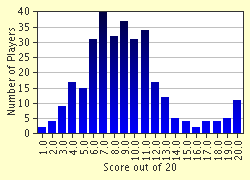Quiz Answer Key and Fun Facts
1. The first Olympic Games for which we still have written records were held in 776 BC. At this Olympic Games, a naked runner, Coroebus, won the sole event at the Olympics, the stade - a run of approximately 192 meters (210 yards). This made Coroebus the very first Olympic champion in history. What was Coroebus's main profession?
2. Which Roman emperor abolished the Olympic Games?
3. There are five colored rings on the Olympic flag. Which one of these is NOT the color of an Olympic Ring?
4. In which city were the Olympics held when the official Olympic flag was first flown?
5. The founder of the modern Olympic Games, Pierre de Coubertin, in 1921 used a Latin phrase of his friend, Father Henri Didon, for the Olympic motto. What was that phrase, that is now an Olympic motto?
6. Victor Boin was first athlete to take the Olympic oath (Antwerp 1920). What was he?
7. In which city did the Olympic flame first appear?
8. Where were the Olympics held when the Olympic Hymn was first performed?
9. Which Olympics saw the first opening ceremony?
10. When was the exact length of marathon established?
11. When were women allowed to participate in modern Olympic Games?
12. For different reasons in certain years the Olympics were not held. Choose the year, when Olympics WERE held.
13. When were the first winter Olympics held?
14. Which of these was NOT a foot race in the ancient Olympics?
15. In the ancient Olympics: running, long jump, javelin, discus and wrestling comprised the ____________ ?
16. According to Aristotle, which athletes 'are the best, because they are naturally endowed with both strength and speed'?
17. Which Games were the first ones televised and were the first to use telex transmissions of the results?
18. Only four countries have participated in every modern Olympic Games - Greece, Great Britain, Switzerland and ____________ ?
19. Which was the first city to host the Summer Olympic Games in the southern hemisphere?
20. In which Olympic Games did drug testing make its debut?
Source: Author
Angua
This quiz was reviewed by FunTrivia editor
gtho4 before going online.
Any errors found in FunTrivia content are routinely corrected through our feedback system.

